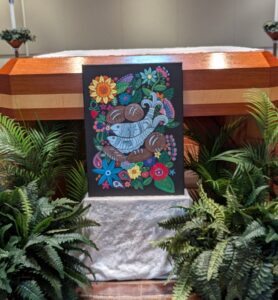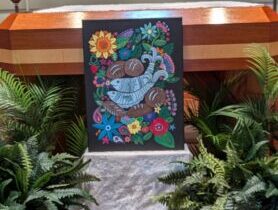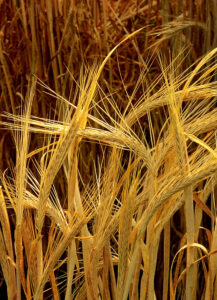Just In Time With God
 The family baby was around three when a flea infestation took over the house. Her mother vacuumed the entire house at least twice a day in an effort to get the fleas under control. But every time the little girl walked through the house, her sleepers were quickly covered with fleas again.
The family baby was around three when a flea infestation took over the house. Her mother vacuumed the entire house at least twice a day in an effort to get the fleas under control. But every time the little girl walked through the house, her sleepers were quickly covered with fleas again.
This had been going on for many days when one morning, the 20+ year-old vacuum wheezed its last. Funds were scarce that month and the family still had a hand vacuum. The woman was about to get it out and start in on the rug, on hands and knees, when a relatively new friend knocked on the door and let himself in. His first words astounded her, “You all don’t know anyone who needs a new vacuum, do you?” Totally unexpectedly, as the result of some sad events in his life, he was no longer going to need his nearly new water vacuum.
It was such an incredible gift and the timing could not have been more perfect. Within a few days, the flea problem was under control. That vacuum was truly a gift both from their friend and from God. An early example of what I’ve come to call, God’s Just-In-Time Financing!
In both the Hebrew and Christian scriptures, we hear stories of the ways God provides for the people in unexpected and seemingly impossible ways. A large crowd had gathered out in the countryside, away from the markets and inns of the small local towns. The prophet had been speaking and people listened to the Lord’s words which he spoke to them, entranced with the message. As time went slipping by, mealtime approached. A man approached the prophet with twenty barley loaves and “fresh grain in the ear.” The prophet told his servant to give this food to the people to eat. It was nowhere nearly enough to feed the one hundred or so people in the crowd, but the prophet insisted. The food was distributed and all ate their fill. There was even food left over!
Who was the prophet? Elisha. Hundreds of years before the coming of Jesus, Elisha trusted that God would provide for the people – and it happened. He didn’t claim that he had miraculously created enough food. He gave the credit to God. It didn’t matter how the Lord managed such a feat. There was precedent. Food falling from the sky as the manna did in the desert. Birds appearing where they could be caught and eaten. Or people sharing what they had so all might eat. The How of it didn’t matter. It was the When of it that did. Just in time. (2 Kgs 4:42-44)
Many years later, when Jesus and the disciples sailed across the Sea of Galilee to get a break from ministry, the people traveled by land and got there ahead of them. All four Evangelists tell us about the events of that afternoon.
The time passed quickly and it was getting to be time for all to eat. Jesus asked his disciples what they would do to feed the people. All they could offer was to send the people home or to the local towns to buy their own meals. Then, as mealtime approached, a child offered his own meal of five barley loaves and two fish to share. The disciples scoffed when Jesus accepted the gift offered by the child. But Jesus told the disciples to have the people sit down in the grassy field and distribute the food to them. There were 5,000 men present – not counting the women and children. It was a huge group!
This day was something of a turning point in Jesus’ ministry. He had been teaching and healing, but the number of people healed was small in comparison with the number touched by the sharing of food that afternoon. Now a large number of people at once were touched by the gift he brought – trust in God and a willingness to share the power of love with all. Food was not expected, but God provided, just in time that day, through Jesus. Now they wondered, when would Jesus do it again? Was he the prophet who was to come? (Jn 6:1-15)
St. Paul wrote to the Ephesians about the way they were called to live with each other in trust of God. Humility, gentleness, and patience are to be hallmarks and the keys to maintaining unity. The community is to remain one in spirit, just as God is One. All share in the one faith, one baptism, and one Lord. (Eph 4:1-6)
We never know when the Lord’s Just-in-time will appear. Sometimes what we need appears. Sometimes it’s something else that shows up, rather than what we thought we really needed. But “the hand of the Lord” is active and present each day of our lives. Our job is to open our eyes to see it and remember to ask sincerely, “Give us this day our daily bread.”
This week, may we keep our eyes open to all the ways God provides for us. And may we be part of God’s team of helpers who reach out to provide kindness and support to those in special need of the Just-in-time touch of the Lord.
Readings for the Seventeenth Sunday in Ordinary Time – Cycle B














